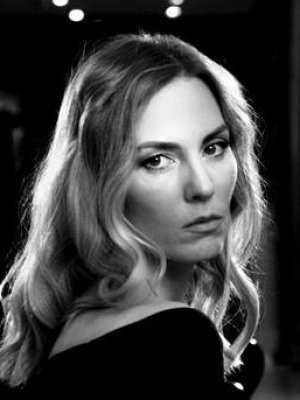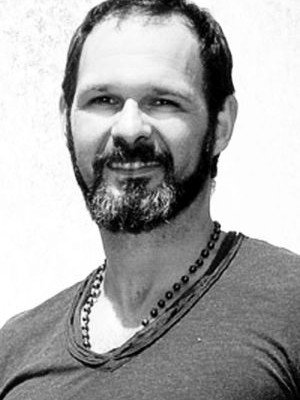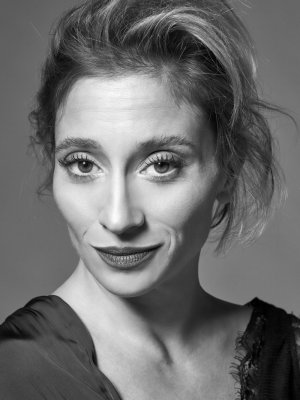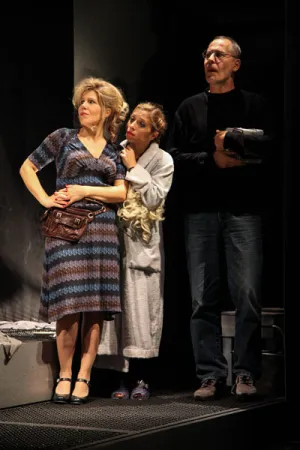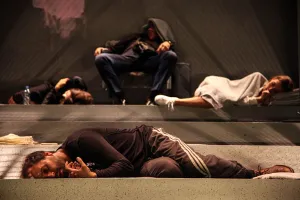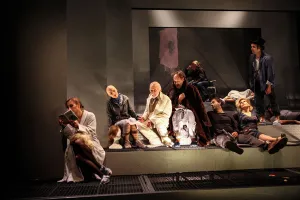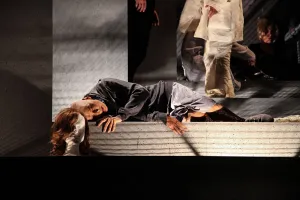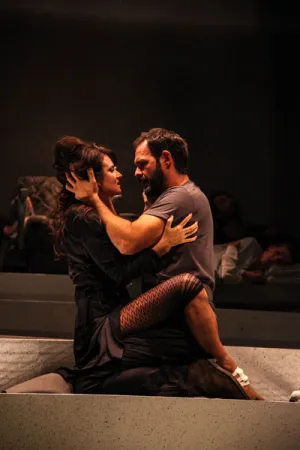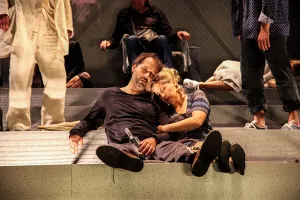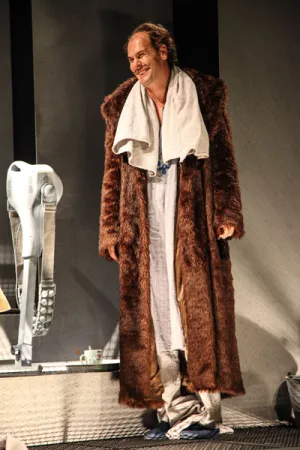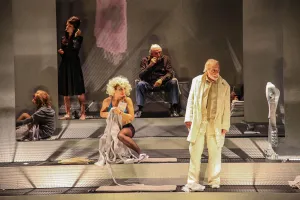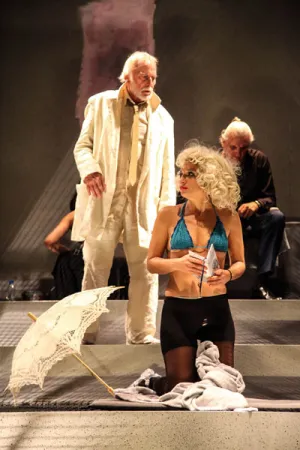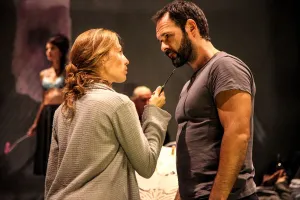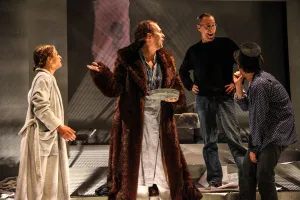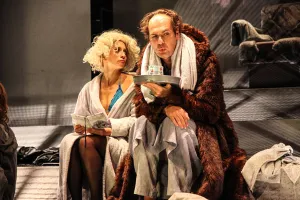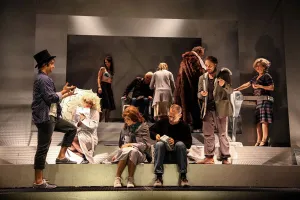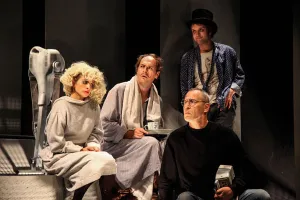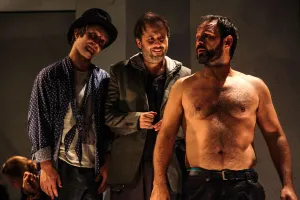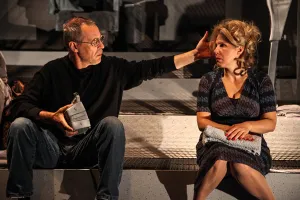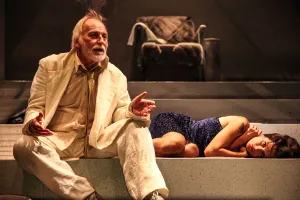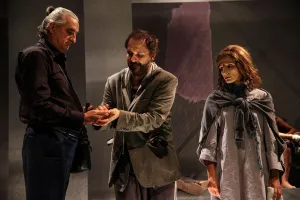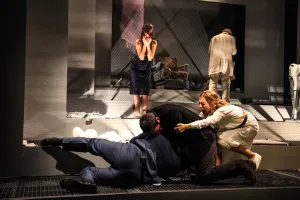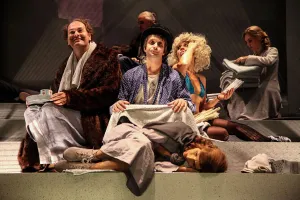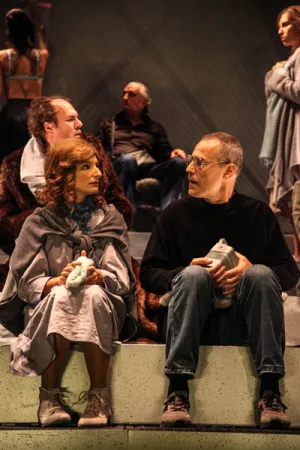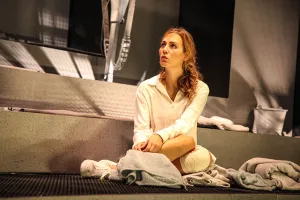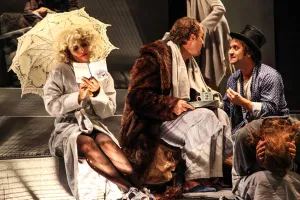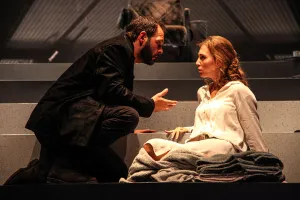The lower depths
drama by Maxim Gorky
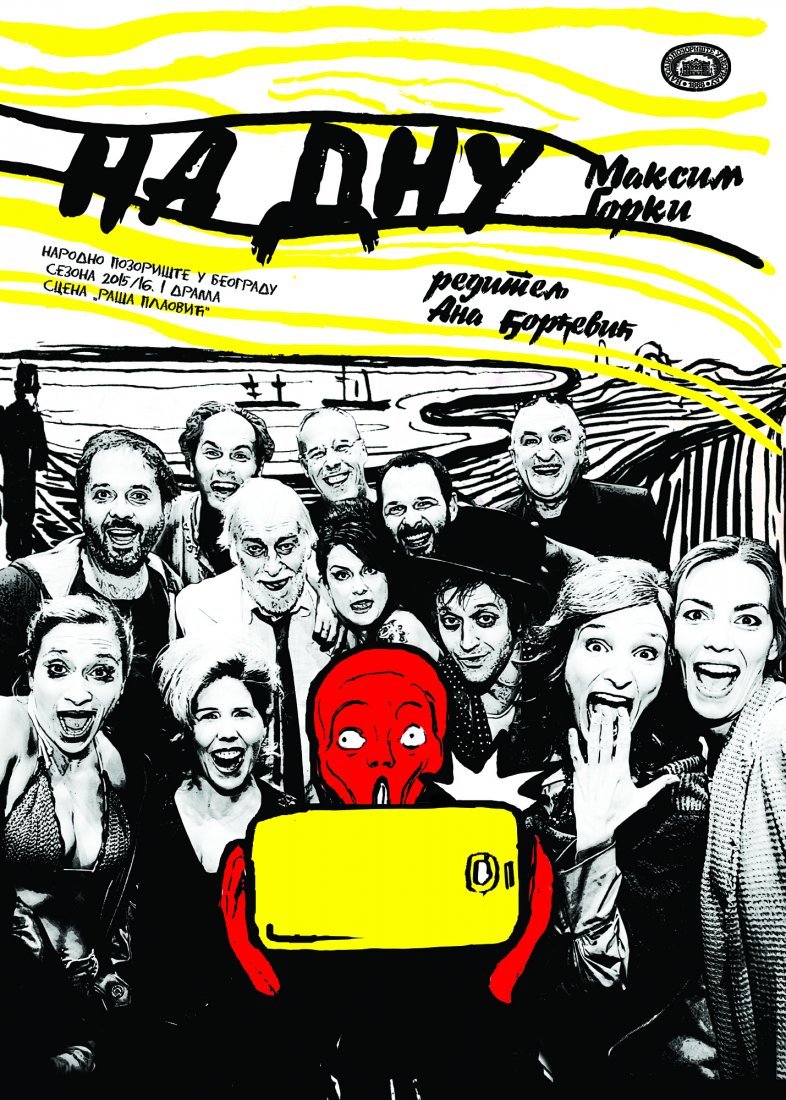
ABOUT THE PLAY
The Lower Depths is the best known of Maxim Gorky’s plays. It was written in late 1901 and early 1902. The play’s proposed titles were Without the Sun, The Doss House, The Bottom, In the Life’s Depths, with proposed subtitles “Scenes” and “Scenes from Russian Life.” In January 1904, the play was awarded with the Griboedov Award and its production in the Moscow Art Theatre was allowed. The premiere took place on 18th December 1902 with much success. The production was stage directed by K. S. Stanislavski (who also interpreted one of main roles – Satine) and Nemirovich-Danchenko. However, staging of the play on the Emperor’s Stage in St. Petersburg was forbidden. The St. Petersburg actors organised reading of the play in the home of N. P. Karabchevsky in 1903, and by the end of 1905, there were several such readings, which had to be approved by the local authority first. The play, titled The Doss House (Nacht-asil), was performed with tremendous success in the Reinhardt’s Theatre, Berlin in 1905 (Max Reinhardt interpreted Luka); the same year, and with as much success, the play premiered in the Ligne Paul’s Theatre “Piece”. International success of the play has lasted throughout the twentieth century and still does today.
According to: www.мхт.ru
For the first time in European dramaturgy, in Maxim Gorky’s play The Lower Depths, conflicts and plot are portrayed by broken people, helplessly residing at the bottom of society… they are the sediment of society. This is why we can observe The Lower Depths as a revolutionary turn in European dramaturgy… (it is) Gorky’s prophetic vision of hard-hearted unworthiness and prison-like human characters throughout the world, even today.
Milenko Misailović, 1985
There are two conflicting, directly opposed reviews regarding the play The Lower Depths. One group find it a master-piece of theatre created under Chekhov’s influence at the beginning of XX century, in which the social reality, with all its limitations, becomes a sort of destiny, main cause of tragic plot through which, with much poetry, the essence of man’s circumstances in the world of cruel laws of classical exploitation is revealed. The others, however, admit that the play has only a relative importance; they see it exclusively as a document, presented within a naturalistic matrix about the end of a civilisation at the eve of the Revolution of 1905; a play which cannot function without the context, because it is deeply rooted in specific geographic, historic and spiritual coordinates of the old Russia’s world.
Vladimir Stamenković, 1985
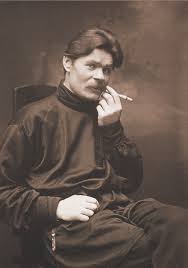 MAXIM GORKY (1868–1936)
MAXIM GORKY (1868–1936)
Aleksey Maksimovich Peshkov was born on March 28, 1868, in Nizhny Novgorod, Russia. His father died from cholera when he was 5 years old. His mother soon remarried and left him to be raised by his maternal grandparents. He had to begin working when he was just 8. His jobs included working as an apprentice, a ship's dishwasher, a factory worker, etc. He learned to read and write along the way, but by the time he was 21 the misery of his life prompted Peshkov to become a hobo, and he spent the next couple years wandering about Russia. In the 1890s, he began writing and adopted the pseudonym Maxim Gorky (choosing the name Gorky because it meant "bitter"). In 1892 his first short story "Makar Chudra," was published in various journals and became very popular with readers. In this and other pieces, Gorky wrote using knowledge gained from living in poverty and on the margins of society. He was the first writer whose caracters were from the lower class. His perspective won him great acclaim around the country, and he was soon viewed as one of its leading writers. His play The Lower Depths was performed in 1902; it became widely popular in Russia and throughout Europe. The novel Mother (1906), a three-volume autobiography and literary portraits of fellow Russian writers such as Leo Tolstoy and Anton Chekhov also became very popular. Gorky was a devoted Marxist and gave much of his writing income to the cause, but he was never an official party member. He was imprisoned for his actions during the Russian Revolution of 1905. On leaving Russia in 1906, Gorky spent seven years as a political exile, living mainly in his villa on Capri in Italy. When the Bolsheviks and Vladimir Lenin seized control of the country in 1917, Gorky objected to their undemocratic tactics even in his newspaper, New Life, wich were shut down in 1918. Eventualy, Gorky was forced to leave Russia in 1921. and was in exile untill 1928, mainly in Sorrento, Italy. During this time he completing his autobiographical trilogy and publishing a new collection of stories. After his last return to Russia he was more than ever the undisputed leader of Soviet writers, and, when the Soviet Writers’ Union was founded in 1934, he became its first president. He remained active as a writer, but almost all his later fiction is concerned with the period before 1917. His eye for physical detail, his talent for making his characters live, his unrivaled knowledge of the Russian “lower depths” make him one of the more important literary figures of his age. On June 18, 1936 (some sources say July), Gorky died at his villa in Gorki Leninskiye, outside of Moscow.
According to: www.britannica.com & www.biography.com
 ANA ĐORĐEVIĆ
ANA ĐORĐEVIĆ
Ana Đorđević was born in Belgrade in 1977. She graduated from the Department of Stage and Radio Directing at the Faculty of Dramatic Arts in Belgrade, mentored by Professor Egon Savin. Premiere of her first production, The Elf, for which she also wrote the text inspired by the Oscar Wilde’s story The Birthday of the Infanta, formally opened the professional theatre scene “Mata Milošević” at the Faculty of Dramatic Arts in 1999. Her first professional stage directing, When You Grow up You’ll Be Me, took place on the Evening Stage of the “Boško Buha” Theatre in 2000. Her graduation piece was Midsummer Night’s Dream by Shakespeare in the City Theatre, Podgorica, in 2001. Since then, she has been directing in theatres in Belgrade, Skopje, Subotica, Banja Luka, Sombor, Kruševac. She wrote texts or dramatised prose works for most of her productions. Some of her productions won numerous awards in festivals in the region. Since 2011, she has been working as an Assistant Professor at the Department of Stage and Radio Directing at the Faculty of Dramatic Arts in Belgrade.
Selection of her works:
Ana Đorđević (after motifs of Serbian fairytale), A Pavilion neither in the Sky nor on the Earth, “Boško Buha” Theatre, 2003
Kiš / Baletić / Đorđević (after the novel Garden, Ashes by Danilo Kiš), The Timetable of Andreas Sam, “Studio” Stage YDT, 2005
J.B.P. Molière, Don Juan, Bitef Theatre, 2005
Jo Roets, Cyrano, Little Theatre “Duško Radović”, Evening Stage, 2006
Giovanni Boccaccio, The Decameron (author of the dramatisation Ana Đorđević), Evening Stage “Boško Buha” Theatre, 2006
Laza Lazarević, The German Girl (author of the dramatisation Ana Đorđević), Yugoslav Drama Theatre, 2009
F. M. Dostoevsky, Notes from the Underground (author of the dramatisation Ana Đorđević), Yugoslav Drama Theatre, 2010
N. V. Gogol, Wedding, National Theatre Sombor, 2010
Petar Mihajlović, The Workers’ Chronicle, Republika Srpska National Theatre, 2010
Mikhail Bulgakov, The Purple Island, Kruševac Theatre, 2012
Ana Đorđević (after motifs from Isidora Sekulić’s piece), The Deacon, Serbian National Theatre, Novi Sad, 2013
Ana Đorđević, The Fourteenth, Republika Srpska National Theatre, 2013
Selection of awards
Laza Lazarević, The German Girl
Annual Award of the YDT for stage directing
Award for Best Performance and the Award for Best Stage Directing at the XVII International Festival “Vršačka jesen”, 2009
N. V. Gogol, Wedding
Award for Best Performance and the Award for Best Stage Directing at the XVIII International Festival “Vršačka jesen”, 2010
Award for Best Performance at the Vojvodina Professional Theatres’ Festival, 2011
Award for Best Performance at the “Fortress-Theatre in Smederevo” Festival, 2011
Petar Mihajlović, The Workers’ Chronicle
Award for best theatre production in Bosnia and Herzegovina in 2010 (awarded by the TmačaART, Magazine for Drama, Theatre and Upbringing)
Award for Best Performance at the Theatre Fest Banjaluka, 2011
Award for Best Performance at the Theatre Festival in Brčko, 2011
Ana Đorđević, The Fourteenth
Award for Best Performance at the Theatre Festival in Brčko, 2013
Numerous awards and recognitions were awarded to artists who worked on her productions, for acting, set design, costume design, etc.
A NOTE BY THE STAGE DIRECTOR
WHAT ARE THE LOWER DEPTHS TODAY
... This is a story about humankind that had reached the lower depths.
And what are the depths?
What is the final point signifying the end?
In the time we live in, ideological approach is a pure luxury. We do not have the time for ideological disputes since the collapse is overwhelming. Distinction between the lie and the truth, preceded by the definition of truth and then the definition of lie, a philosophical approach applied in order to define and solve the acute social issues – is a luxury that philosophers and writers of the previous century and the one before it had. Today, we are quite adept when making distinction between propaganda and facts. Our world is congested with information. We do not lack the insight into the truth about social injustice, which was, according to Gorky, the case with the audiences of his time. We do not even need anyone to suggest a solution to us, because all the past “solutions” have brought disappointment to humankind. The humankind does not even dream about better times. A man of today is focused only on survival. We can get impoverished even more, starve or succumb to illnesses. We can witness small personal injustices, even the big social ones. We can watch how the powerful ones trample over our dignity, how they quash our right to live and insult our common sense. However, having all this in mind, the depths would be reached if we harm, belittle or ignore other human being. If we lose the wish to interact with people close to us and if we lose the conviction that they would ever pay attention to us. If a man next to us is abandoned in brutal circumstances and if we add to it… Basic characteristic is lack of any compassion… The imperative is to eliminate empathy and love. There is no empathy. There is no love. Love is merely a neon sign saying, “I love you”. In such a world, having compassion is considered a path towards self-destruction. There are people, in our world, who desperately protect only their own possessions, however small they may be, and their own small, personal space… Our characters believe that they need to be strong to survive, but the strength is identified with cruelty… People need grace more than anything else… they need to be recognised, seen and heard, since our inferno lies in complete lack of recognition of our person by the people around us; the inferno is in the fact that nobody sees or hears us, we are invisible and non-existent. In Edvard Munch’s painting The Scream, the most terrifying thing is that there are two people peacefully walking by behind the person transformed into the scream; they do not hear or see anything. Without these two silhouettes of passers by, who are either in their own everyday calm state of mind or quietly contemplating their own hidden problems, the painting would not have its full meaning.
(Taken from the explication)
THE LOWER DEPTHS BY MAXIM GORKY IN THE NATIONAL THEATRE
“Mikhail Ivanovich Kostilyoff (Mr. Božović) and his wife Vassilisa (Miss Jurković) rent beds in their cellar. Tenants in this bandit cave are ‘former people’, god’s creatures who cannot descend any lower because there is nowhere else to go, they are the bottom layer of society, the sludge unable to elevate themselves from present circumstances. There is no tempest that can change their destinies, because as soon as the tempest is over – the sediments will settle down, because it is their destiny, their place…” This is how the critic of The Nova Iskra begins his review of the first Belgrade premiere of The Lower Depths by Maxim Gorky. The first premiere took place on 29th January 1904, on stage of our National Theatre, called the Royal Serbian National Theatre at the time. Maga Magazinović, an initiator of artistic dance in our country and a very intriguing and educated woman, translated the play from Russian and Ilija Stanojević Čiča, one of first actors, stage directed the production – as was the custom at the time – and interpreted the role of Baron in the play. After elaborate description of characters and the plot, as well as numerous quotes in order to inform prevalently uneducated public about the play, the critic assesses that previously performed piece by the same author, Small Town’s Folks, was better and closer to our mentality. He criticises the casting, the set, the costume design and the translation, but then concludes, “The actors have invested a lot of good will to learn and interpret, but it is not their fault that things did not happen according to their liking.” Despite the reviewer’s assessment that the play does not go well with the Belgrade audiences, the production had nine performances in period before the First World War, which was an impressive number at the time. In the period between the two world wars, there were two tours of the troupe consisting of former actors of the famous Moscow Art Theatre (MAT). They toured the countries of Eastern Europe in that period in order to flee from the revolution in their country. The Russian artists introduced the Stanislavski’s system to our artists, and fascinated with the system, our artists start implementing it. During the 1930’s tour, the Russian troupe performed their interpretation of The Lower Depths by Maxim Gorky. At the performance on 26th October, Polikarp Pavlov interpreted the role of Luka and Vera Grech interpreted Vassilisa. Seven years later, the National Theatre invited them (they were partners in both theatre and life) to stage the same play with our ensemble’s leading actors. The opening took place on 1st April 1937, and the roles were interpreted by the best actors of the time led by Grechova and Pavlov in their previous roles. The critics, as it often happens, were divided. While one group of critics assesses that the premiere was the main event of the season, the other group compare it to MAT’s production and find the local production substandard. They criticise the inconsistency when our ensemble’s interpretation is concerned; although they do not blame the cast, they find the organisation in the Theatre intermittent, because preparations for the premiere took only days and according to the Stanislavski’s system there had to be several months of elaborate preparations. The critics were unanimous when praising the guest artists and stated that the National Theatre’s management should do everything in their power to keep Grechova and Pavlov in the ensemble – both as actors and as stage directors, because their creative and pedagogical work with the ensemble would be priceless and tremendously important. This happened in the following season. Their staging of The Lower Depths, however, lasted for only two seasons on the repertory; by the end of the 1936/37 season, it was performed five times and in the following season, three times more. The last premiere of the Maxim Gorky’s play on stage of the National Theatre took place on 17th February 1985. Milan Đoković translated the play and Cisana Murusidze directed it. Although the critics praised the return of this classical piece on the repertory, as well as “engagement of seven novice actors, which is a rarity in Yugoslav theatre”, they did not give positive reviews to the production. The statistics, however, show that the audience did not share the critics’ opinion – although the production was on the repertory for only two seasons, it was performed 19 times for more than 10000 people, which means that the hall was always full to capacity.
Jelica Stevanović
Premiere performance
Premiere 3. October 2015 / „Raša Plaović“ Stage
Translated by Milan Đoković
Stage Directing and Adaptation Ana Đorđević
Dramaturge Slavko Milanović
Set Designer Dragana Macan
Costume Designer Lana Cvijanović
Sound Design Vladimir Petričević
Stage Speech Dejan Sredojević, Ph.D.
Assistant Stage Director Tara Manić
Executive Producer Ivana Nenadović
Producer of production Natalija Ignjić
Premiere cast:
Mikhail Ivanov Kostoloff Gojko Baletić
Vassilisa Karpovna Sonja Kolačarić
Natasha Kalina Kovačević
Vaska Pepel Aleksandar Srećković
Anna Milena Đorđević
Nastya Vanja Ejdus
Kvashnya Zlatija Ivanović
Kleeshtsh Darko Tomović
Satine Nemanja Oliverić
The Actor Andrej Šepetkovski
The Baron Miloš Đorđević
Luka Tanasije Uzunović
Prompter Jelena Halupa
Stage Manager Sanja Ugrinić Mimica
Assistant Set Designer Jasna Saramandić
Assistant Costume Designer Sonja Mrkobrada
Light Operator Miodrag Milivojević
Make-Up Dragoljub Jeremić
Set Crew Chief Zoran Mirić
Sound Operator Nebojša Kostić
SETS AND COSTUMES WERE MADE IN THE NATIONAL THEATRE’S WORKSHOPS

